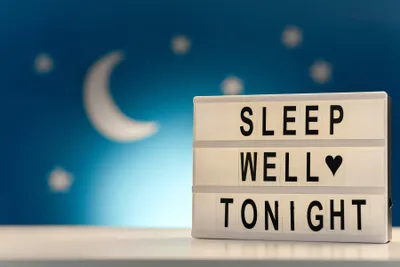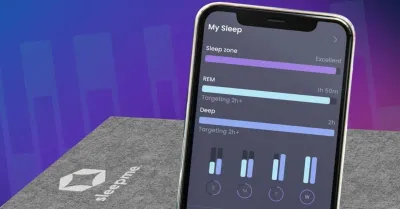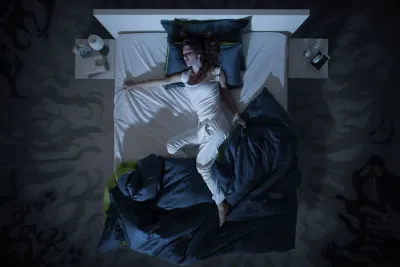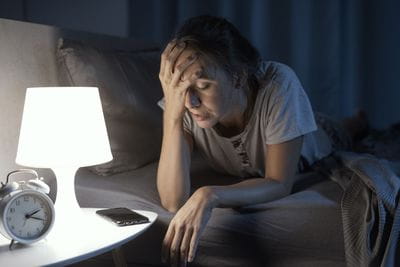
Key Takeaways
- Establish a Consistent Sleep Schedule: Establish a consistent sleep schedule to regulate your body's internal clock.
- Routine: Create a relaxing bedtime routine and optimize your sleep environment.
- Relaxation Techniques: Practice relaxation techniques, such as deep breathing and mindfulness.
- Limit Caffeine and Heavy Meals: Avoid consuming caffeine and large meals close to bedtime, as they can interfere with your ability to fall asleep quickly.
- Optimize Your Sleep Environment: Create a cool bedroom (ideally between 60°F and 67°F), dark, and quiet.
Relaxation is essential to falling asleep quickly, as it prepares the body and mind for sleep. Various activities, including meditation, breathing exercises, and guided imagery, can promote improved sleep.
Experiencing difficulty falling asleep is a common challenge for many individuals, whether it’s night sweats, or stress. If you’ve encountered this issue, you’re not alone. A recent study found approximately 30% of adults experience difficulty falling asleep occasionally. [1]
Not being able to sleep is frustrating. It can also make it harder to sleep in the future. This is because it affects your sleep latency.
But with the right techniques and strategies, you can learn to fall asleep faster. Follow these methods for better sleep, but remember that everyone’s sleep patterns are different.
Below, we will discuss some of the best tips to help you get to sleep quickly. From relaxation techniques to lifestyle changes, these strategies will help you drift off into dreamland faster than ever before.
Transform Your Sleep: Discover Ultimate Cool Comfort
Ready for sleep that truly rejuvenates? Don't wait – discover the Chilipad Dock Pro and say hello to consistently cool, restful nights
Establish a Consistent Sleep Schedule
Creating a regular sleep routine is one of the most effective ways to signal your body when it’s time to sleep. Aim to go to bed and wake up at the same time every day, even on weekends. This consistency helps regulate your circadian rhythm, making it easier to fall asleep and wake up feeling refreshed.
Related Blog: Get a better understanding of sleep hygiene and why it is important.
Avoid Clock-Watching
Constantly checking the time can increase anxiety about not falling asleep. Turn your clock away from view and focus on relaxing instead. If you find yourself unable to sleep after 20 minutes, get out of bed and engage in a calming activity until you feel sleepy again.
Practice the 4-7-8 Breathing Method
Dr. Andrew Well developed the 4-7-8 breathing method, a simple breathing technique that can help you relax and fall asleep faster. It's based on breath control techniques from yoga and has a consistent breathing pattern that calms the nervous system.
The 4-7-8 breathing technique is a simple yet effective way to promote relaxation. Inhale through your nose for 4 seconds, hold your breath for 7 seconds, and then exhale slowly through your mouth for 8 seconds. This method can help calm your mind and prepare your body for sleep.
Optimize Your Sleep Environment
Your bedroom should work as hard as you do to support great sleep. Keep it cool—ideally between 60°F and 67°F (15.6°C to 19.4°C)—and dark with blackout curtains. Block out noise with earplugs or a white noise machine, and don’t underestimate the power of a comfortable mattress and pillows. A dialed-in sleep environment is your best upgrade for better rest.
Did You Know: Your body has its own regulatory system called the circadian rhythm. This internal clock cues your body to feel alert during the day but sleepy at night. Our cooling bed systems help you sleep cooler all night long at a precise temperature.

Create a Consistent Bedtime Routine
Engaging in calming activities before bed can help prepare your mind and body for sleep.
Consider:
- Reading a book
- Listening to soft music
- Listening to a favorite podcast for sleeping
- Practicing relaxation techniques such as deep breathing or meditation
We get it—unplugging isn’t easy. But powering down your screens at least an hour before bed helps. Blue light from devices disrupts melatonin production, making it harder to fall asleep. Give your brain the break it deserves, and let your sleep cycle do its thing.
Limit Exposure to Light
Exposure to light can interfere with your body’s natural sleep-wake cycle, leading to worse sleep quality. To fall asleep faster, limit your exposure to light and electronic devices before bedtime. This also means avoiding bright screens, including your T.V., smartphone, computer, and any other devices, at least an hour before bed.
Fun Fact: These devices emit a blue light that simulates sunlight.
If you find it challenging to stop using tech before bed, slowly reduce the time leading up to bed.
Limit Daytime Napping
While napping can be beneficial, long or irregular napping during the day can negatively affect your nighttime sleep. If you need to nap, keep it short—around 20-30 minutes—and avoid napping late in the afternoon.
To understand the optimal duration for daytime rest, you can explore resources that discuss the ideal nap length and its impact on your overall well-being.
Engage in Mindfulness and Meditation
Stress is typically the primary cause of delayed sleep. After all, how often have you been in bed only to stay awake because of a racing mind? According to various sleep medicine reviews, techniques like meditation and breathing exercises have been shown to improve sleep quality.
Sleep Tip: Some individuals use nature sounds to help unwind, including white noise (or another color, such as pink noise).
Listening to Peaceful and Relaxing Music
Music can help reduce stress and anxiety, two common culprits of sleep problems. When you listen to calming music, your body produces less cortisol, [4] the hormone associated with stress, and more melatonin, which helps regulate sleep.
Plus, music can help to slow down your breathing and heart rate, which can promote relaxation and help you drift off to sleep more quickly.
If you want to use music to help you sleep, you must choose the right kind. Avoid music with lyrics, which can be distracting, and opt for slow, instrumental music instead.
Listening to soothing sounds podcasts can also help you relax and fall asleep faster. If you find music distracting, many people recommend the benefits of white noise for enhancing sleep.
Limit Caffeine and Heavy Meals
Be mindful of what you consume in the hours before bedtime. Avoid caffeine and nicotine, as these stimulants can keep you awake. Also, steer clear of heavy meals and excessive fluids within two hours of bedtime to prevent discomfort and frequent trips to the bathroom during the night.

Use Aromatherapy
If you're having a hard time falling asleep, there are certain scents, such as lavender, have been shown to promote relaxation and improve sleep quality. Consider using essential oils in a diffuser or applying them to your pillow to create a calming atmosphere conducive to sleep.
Top Scents to help you get a good night's sleep:
- Lavender – The gold standard for sleep scents. Known to lower heart rate and blood pressure, setting the stage for relaxation.
- Chamomile – Not just for tea. Its calming aroma helps reduce anxiety and promotes restful sleep.
- Sandalwood – Earthy and grounding, sandalwood is perfect for easing an overactive mind before bed.
- Vanilla – Sweet, soothing, and cozy—vanilla’s scent helps reduce stress and creates a calming sleep environment.
- Cedarwood – Warm and woodsy, cedarwood supports deep relaxation and has mild sedative properties to help you drift off faster.
Stay Active During the Day
Regular physical activity can help you fall asleep faster and enjoy deeper sleep. Aim for at least 30 minutes of moderate exercise most days of the week. However, avoid vigorous workouts close to bedtime, as they may have the opposite effect.
Journaling Before Bed
If your mind’s running a mile a minute and having trouble sleeping, try journaling before bed. Jot down your thoughts, tomorrow’s to-do list, or anything weighing on you. Getting it out of your head and onto paper can ease anxiety and help you power down for sleep.
Focus on Staying Awake
It sounds counterintuitive, but trying to stay awake—known as paradoxical intention—can actually help you fall asleep. Shifting the focus takes the pressure off, easing anxiety and letting sleep come naturally.
Experiment with Sleep Positions
Your sleep position matters more than you think. Side sleeping often gets the spotlight for promoting better rest, but the real win is finding what feels comfortable for you—because the best position is the one that helps you drift off faster.
How Long Does it Take to Fall Asleep?
Sleep latency, also known as sleep onset latency, refers to how long it requires someone to fall asleep. Pre-sleep cognitive activity, such as engaging in relaxing thoughts and activities, can significantly influence how quickly you fall asleep.
Generally, a healthy sleep latency period ranges between 15 to 20 minutes. [2] This time frame excludes pre-sleep bedtime routines such as taking a shower, brushing teeth, or practicing meditation but pertains to falling asleep after getting into bed.
Seek Professional Help if Needed
If your sleep struggles stick around, it’s worth checking in with a healthcare professional. They can help pinpoint any underlying issues and guide you toward treatments or therapies that actually work.
Final Thought
While no single method works for everyone, experimenting with different techniques can help you find what works best for you. By prioritizing sleep and adopting healthy sleep habits, you can fall asleep faster and wake up refreshed and energized daily.
Consulting with a healthcare professional might be a good idea if you still have trouble falling asleep even after trying the above tips. There could be an underlying sleep disorder or other medical condition that's affecting your sleep quality.
Your doctor can help you identify the issue and develop an appropriate treatment plan, including medication, therapy, or other interventions to help you get the restful sleep you need.
Citations/Resources
[1] Bhaskar, S., Hemavathy, D., & Prasad, S. (2016). Prevalence of chronic insomnia in adult patients and its correlation with medical comorbidities. Journal of family medicine and primary care, 5(4), 780–784. View Study
[2] Jung, D. W., Hwang, S. H., Chung, G. S., Lee, Y. J., Jeong, D. U., & Park, K. S. (2013). Estimation of sleep onset latency based on the blood pressure regulatory reflex mechanism. IEEE journal of biomedical and health informatics, 17(3), 534–544. View Study
[3] Ong, J. C., Manber, R., Segal, Z., Xia, Y., Shapiro, S., & Wyatt, J. K. (2014). A randomized controlled trial of mindfulness meditation for chronic insomnia. Sleep, 37(9), 1553–1563. View Study
[4] Koelsch, S., Fuermetz, J., Sack, U., Bauer, K., Hohenadel, M., Wiegel, M., Kaisers, U. X., & Heinke, W. (2011). Effects of Music Listening on Cortisol Levels and Propofol Consumption during Spinal Anesthesia. Frontiers in psychology, 2, 58. View Study
Frequently asked questions
How Can I Fall Asleep Quicker?
Below are some of the best tips on how to fall asleep quicker:
- Maintain a consistent sleep schedule
- Create a relaxing bedtime routine
- Optimize your sleep environment (dark, quiet, cool)
- Limit screen time before bed
- Avoid caffeine and alcohol before sleep
- Practice relaxation techniques
- Get regular exercise (earlier in the day)
- Light snack before bed
- If you can't sleep, get out of bed
How Can I Fall Asleep Fast Now?
If you’re wondering how to fall asleep fast right now, try these quick tips to help you drift off in no time:
- Dim the lights and power down screens
- Try the 4-7-8 breathing technique
- Take a warm shower or bath
- Cool down your room temperature
- Slip into breathable, lightweight sleepwear
- Listen to calming white noise or sleep sounds
- Jot down racing thoughts in a journal
- Avoid caffeine, alcohol, or heavy meals
- Use a cooling mattress topper
- Practice progressive muscle relaxation
- Get comfortable—adjust your pillow and blankets









